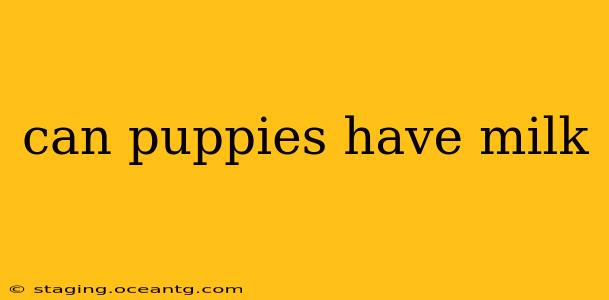Bringing home a new puppy is an exciting experience, filled with playful moments and endless cuddles. However, navigating the world of puppy care can be overwhelming, especially when it comes to their diet. One common question new owners ask is: Can puppies have milk? The short answer is: it's complicated. While the image of a puppy lapping up a bowl of milk might seem endearing, the truth is more nuanced. This guide will delve into the complexities of milk and puppies, addressing common concerns and providing you with the knowledge to make informed decisions about your puppy's nutrition.
Is Cow's Milk Good for Puppies?
No, cow's milk is generally not recommended for puppies. While puppies may initially show interest and even lap it up, cow's milk lacks the necessary nutrients for their developing bodies and can actually be harmful. Cow's milk contains high levels of lactose, a sugar that many puppies are intolerant to. This can lead to diarrhea, vomiting, and other digestive upset. Furthermore, cow's milk lacks the specific balance of proteins, fats, and vitamins essential for a puppy's rapid growth.
What Kind of Milk Can a Puppy Drink?
While cow's milk is a no-go, there are some milk alternatives that might be considered under specific circumstances and always with veterinary supervision. Puppy milk replacer is specifically formulated to meet the nutritional needs of puppies, especially orphaned or rejected ones. These formulas are designed to mimic a mother's milk and provide the essential nutrients for healthy growth. However, it's crucial to remember that these are not substitutes for a mother's care if possible.
Can Puppies Have Goat Milk?
Goat milk is often touted as a healthier alternative to cow's milk due to its lower lactose content and easier digestibility for some individuals. However, while it might cause fewer digestive issues than cow's milk, goat milk still isn't a complete substitute for a puppy's nutritional requirements. It shouldn't be given as a primary source of nutrition and is best avoided unless specifically recommended by a veterinarian.
My Puppy Drinks Milk – Is it a Problem?
If your puppy has access to and has consumed cow's milk, monitor them closely for signs of digestive upset such as diarrhea, vomiting, or abdominal pain. If any of these symptoms appear, contact your veterinarian immediately. Preventing future access to milk is essential.
What Should I Feed My Puppy Instead of Milk?
The best food for a puppy is high-quality puppy food formulated to meet their specific nutritional needs. These foods are balanced in protein, fat, vitamins, and minerals to support healthy growth and development. Consult with your veterinarian to determine the most appropriate diet for your puppy's age, breed, and size. Water should always be freely available.
How Much Milk Should a Puppy Drink?
As mentioned above, avoid giving your puppy cow's milk. If using a puppy milk replacer, follow the instructions on the packaging carefully. Overfeeding can lead to additional health problems. Always consult your veterinarian for the correct amount based on your puppy's specific needs.
When Can Puppies Start Drinking Water?
Puppies should have access to fresh, clean water from a very young age. Even newborn puppies, particularly those that are orphaned or rejected, can be offered water with a syringe or dropper under veterinary guidance.
Can I Give My Puppy Other Dairy Products?
Generally, it's best to avoid all dairy products for puppies. The high lactose content and potential for digestive upset make dairy products unsuitable for their sensitive systems. Focus on providing a well-balanced diet based on high-quality puppy food and plenty of fresh water.
By following these guidelines and prioritizing your puppy's nutritional needs, you can ensure their healthy growth and development. Remember, always consult with your veterinarian for personalized advice on your puppy's diet and overall care. They can provide tailored recommendations based on your puppy’s specific breed, age, and health status.
